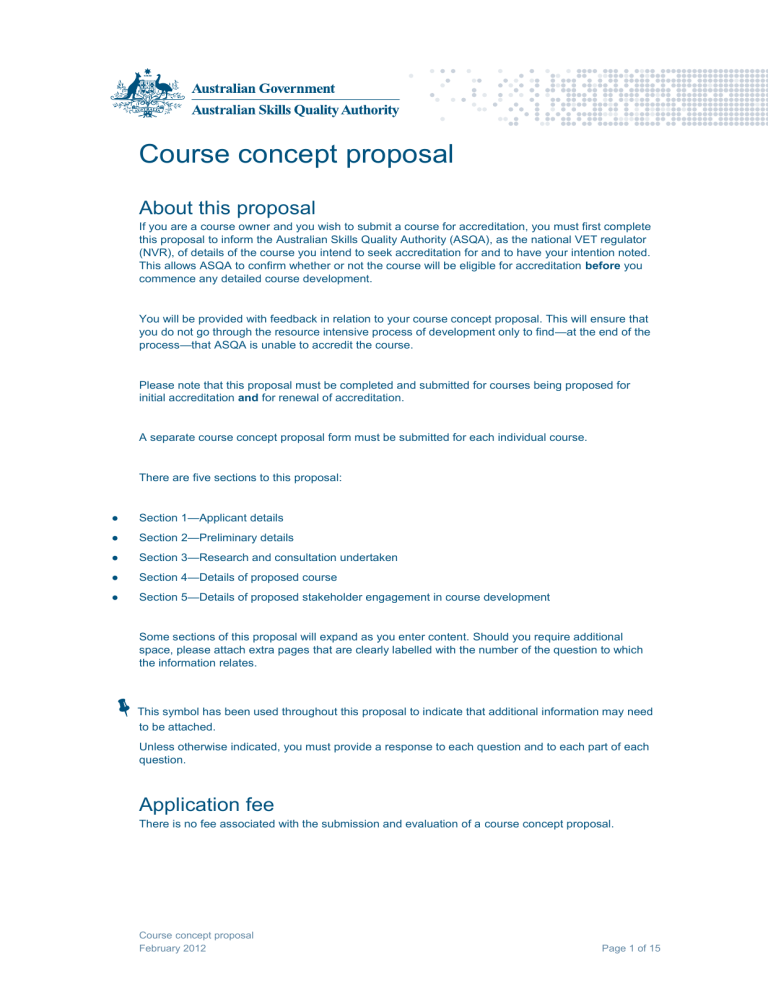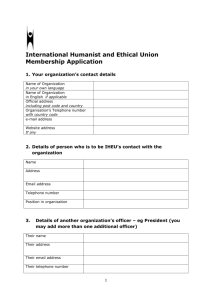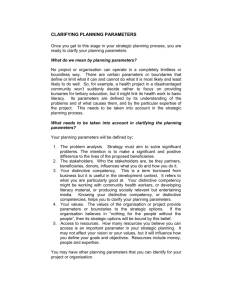Course concept proposal - Australian Skills Quality Authority

Course concept proposal
About this proposal
If you are a course owner and you wish to submit a course for accreditation, you must first complete this proposal to inform the Australian Skills Quality Authority (ASQA), as the national VET regulator
(NVR), of details of the course you intend to seek accreditation for and to have your intention noted.
This allows ASQA to confirm whether or not the course will be eligible for accreditation before you commence any detailed course development.
You will be provided with feedback in relation to your course concept proposal. This will ensure that you do not go through the resource intensive process of development only to find
—at the end of the process —that ASQA is unable to accredit the course.
Please note that this proposal must be completed and submitted for courses being proposed for initial accreditation and for renewal of accreditation.
A separate course concept proposal form must be submitted for each individual course.
There are five sections to this proposal:
● Section 1 —Applicant details
● Section 2 —Preliminary details
● Section 3 —Research and consultation undertaken
● Section 4 —Details of proposed course
●
Section 5
—Details of proposed stakeholder engagement in course development
Some sections of this proposal will expand as you enter content. Should you require additional space, please attach extra pages that are clearly labelled with the number of the question to which the information relates.
This symbol has been used throughout this proposal to indicate that additional information may need to be attached.
Unless otherwise indicated, you must provide a response to each question and to each part of each question.
Application fee
There is no fee associated with the submission and evaluation of a course concept proposal.
Course concept proposal
February 2012 Page 1 of 15
Submitting the proposal
This proposal must be submitted by email to: accreditation@asqa.gov.au.
Your proposal must be accompanied by the required attachments. Incomplete proposals or proposals completed incorrectly will be returned to you for completion. A Checklist for submitting a course concept proposal has been provided at the back of this form to help you ensure your proposal is complete.
Assistance in completing this form
For assistance in completing this proposal, please contact the Accreditation team by email at accreditation@asqa.gov.au
. Further information about course accreditation and the proposal process is available from the ASQA website at www.asqa.gov.au
.
Course concept proposal
February 2012 Page 2 of 15
Section 1: Applicant details
1.1 Evaluation of the proposal
ASQA has authority to accredit and regulate accredited courses under the National Vocational
Education and Training Regulator Act 2011 (Cwlth). ASQA is also a delegate for the Training and
Employment Recognition Council (Queensland) with respect to the accreditation of courses under the
Vocational Education, Training and Employment Act 2000 (Qld).
This course concept proposal is being submitted for evaluation to (select one option):
ASQA
—as the national VET regulator (NVR)
ASQA
—as delegate for the Training and Employment Recognition Council (Queensland)
1.2 Details of course owner/s
This course will be owned by one or more individuals
—provide details of each individual
This course will be owned by one or more organisations
—provide organisation name and details of a contact person for each organisation
Course owner 1 Individual
Organisation name (if relevant):
Organisation
Details of individual owner or contact person for the organisation:
Title: Surname:
Phone: Fax:
Email:
Postal address:
Given name(s):
Mobile
Course owner 2 Individual
Organisation name (if relevant):
Organisation
Details of individual owner or contact person for the organisation:
Title:
Phone:
Email:
Postal address:
Surname:
Fax:
Given name(s):
Mobile
Course concept proposal
February 2012 Page 3 of 15
Details of additional course owners are attached.
1.3 Primary contact details
Where there is more than one course owner listed in question 1.2, which of the listed owners should
ASQA communicate with about this course concept proposal .
If there is only one course owner, please go to Section 2.
Course owner 1 Course owner 2 Course owner 3 Course owner 4
Section 2: Preliminary details
2.1 Is this course currently accredited?
Yes
—provide details of the course
No
—go to question 2.2
Code: Title:
Expiry date:
2.2 Has this proposal been submitted for consideration to any other state or territory course accrediting body?
Yes
—provide details of the submission
No
—go to question 3.1
State/territory:
Title of course submitted:
Date submitted:
Detail the outcome of the submission:
Date outcome received:
Course concept proposal
February 2012 Page 4 of 15
Section 3: Research and consultation undertaken
3.1 Industry Skills Council (ISC) coverage
Do the intended outcomes of this course fall within (or can be associated with) an ISC
’s area of industry coverage?
Yes
—which ISC? (Select from the list below)
No
AgriFood Skills Australia
Community Services and Health Industry Skills Council
Construction and Property Services Industry Skills Council
Electrocomms and Energy Utilities Industry Skills Council
ForestWorks
Government Skills Australia
SkillsDMC National Industry Skills Council
Transport and Logistics Industry Skills Council
3.2 Duplication of outcomes of endorsed training package qualification
The proposed course duplicates by title, or coverage, the outcomes of an endorsed training package qualification.
Innovation and Business Skills Australia
Interim contact for Automotive
Manufacturing Skills Australia
Service Skills Australia
The proposed course does not duplicate, by title, or coverage, the outcomes of an endorsed training package qualification.
Confirmation of this from the IS
C is attached (where the answer to question 3.1 (above) is ‘yes’)
3.3 Research undertaken and evidence of the need for the course
Describe, in detail, the research undertaken and the evidence gathered of the need for the course:
Course concept proposal
February 2012 Page 5 of 15
3.4 Which organisations/individuals have been consulted in establishing a need for the course and in developing this proposal?
○ Relevant ISCs must have been consulted where intended course outcomes fall within an ISC’s area of industry coverage.
○ Industry regulatory and/or licensing bodies must have been consulted if the course is proposing to deliver an industry regulatory or licensed outcome.
○ ASQA may contact some or all of the organisations/individuals included in the following table during the evaluation of the proposal.
Name Organisation Phone number Email address Description of the consultation activity/ies
Summary of the outcome of the consultation activity/ies
Type of organisation
(select best fit from the organisation key below)
An additional list of organisations and/or people consulted, and a description of the consultation activity and outcomes, is attached.
Organisation key
1 = Industry Skills Council
5 = Professional association
2 = Industry group 3 = Employee organisation
6 = Regulatory and/or licensing body 7 = Community organisation
4 = Employer organisation
8= Other
Course concept proposal
February 2012 Page 6 of 15
3.5 Analysis of current nationally recognised Training Packages undertaken
(a) Training Packages
There are more than 80 currently endorsed Training Packages in over 30 industry areas. Identify the training packages in the same industry area as the proposed course.
Code: Title:
Code:
Code:
Code:
Title:
Title:
Title:
An additional list of training packages is attached.
(b) Training Package qualifications
There are in excess of 2000 currently endorsed Training Package qualifications. Identify the qualifications that have been evaluated but not considered suitable to meet the needs and outcomes identified in the proposed course and describe why they are not considered suitable:
Code: Title:
This qualification is not considered suitable to meet the needs and outcomes identified because:
Code: Title:
This qualification is not considered suitable to meet the needs and outcomes identified because:
Code: Title:
This qualification is not considered suitable to meet the needs and outcomes identified because:
Code: Title:
This qualification is not considered suitable to meet the needs and outcomes identified because:
Code: Title:
This qualification is not considered suitable to meet the needs and outcomes identified because:
An additional list of qualifications is attached.
Course concept proposal
February 2012 Page 7 of 15
(c) Training Package units of competency
There are in excess of 25,000 currently endorsed units of competency.
(i) Identify the training package units of competency which may be suitable for inclusion in the proposed course.
Code:
Code:
Title:
Title:
Code:
Code:
Code:
Code:
Code:
Code:
Code:
Title:
Title:
Title:
Title:
Title:
Title:
Title:
An additional list of units is attached.
(ii) Identify the training package units of competency which have been evaluated but are not considered suitable for the proposed course and describe why they are not considered suitable.
Code: Title:
This unit is not considered suitable because:
Code: Title:
This unit is not considered suitable because:
Code: Title:
This unit is not considered suitable because:
Code: Title:
This unit is not considered suitable because:
Course concept proposal
February 2012 Page 8 of 15
Code: Title:
This unit is not considered suitable because:
An additional list of units is attached.
(iii) Identify the skills and knowledge gaps not covered by training package units of competency that the course proposes to cover.
Section 4: Details of proposed course
4.1 Subject area of the proposed course
4.2 Anticipated course title (if known at this stage)
4.3 Anticipated Australian Qualifications Framework (AQF) outcome
Statement of A ttainment (‘ Course in...’
)
OR
Qualification – nominate anticipated AQF level:
Provide a rationale for the anticipated AQF level:
Course concept proposal
February 2012 Page 9 of 15
4.4 Anticipated nominal hours
4.5 Anticipated need for the course
The proposed course is required to meet the needs of:
Industry
Legislative
Enterprise
Community
Education
Other (specify)
Clearly describe how the proposed outcomes of the course will meet the needs of the nominated group:
4.6 Rationale for proposing accreditation
Provide the rationale for proposing that the course be given national recognition within the National
Skills Framework:
4.7 Recognition to be given to the course
It is anticipated that the outcomes of this course will be given recognition by:
a licensing body
a regulatory body
an industry body
a professional body
Other (specify)
recognition will not be given by any such bodies
Name of body:
Clearly describe the proposed recognition that will be given:
Course concept proposal
February 2012 Page 10 of 15
An additional list of bodies and proposed recognition is attached.
4.8 Provide a clear description of the target group/s for the course
4.9 Provide a clear description of anticipated entry requirements into the course (if none, insert
‘Nil’)
4.10 Provisional course structure
Anticipated total number of units to gain qualification:
Comprising: core units/modules plus elective units/modules
4.11 Do you anticipate developing units of competency for inclusion in the course?
Yes – provide details of the units No – go to question 4.12
Draft unit title Description of content and skill area
An additional list of units is attached.
4.12 Do you wish, at this stage, to apply for permission to develop modules for inclusion in the course?
Yes
– provide rationale and detail of modules
No
– go to Section 5
Provide the rationale for why it is not possible to develop appropriate competency standards:
Course concept proposal
February 2012 Page 11 of 15
Draft module title Description of content and skill area
Note: Granting permission for the development of modules is at the sole discretion of ASQA as the course accrediting body. Permission must be sought and granted prior to development of the modules.
Section 5: Details of proposed stakeholder engagement in course development
5.1 Proposed stakeholder engagement
To ensure industry and other relevant stakeholders are fully engaged in the development and design of the course, consultation with stakeholders is to be ongoing through the course development stage.
This engagement will also assist in validating the intended skills and knowledge outcomes of the course. It is strongly recommended that a course development advisory committee/industry reference group be formed as the mechanism for facilitating this regular and ongoing consultation.
○
Relevant ISCs must be engaged in development where intended course outcomes fall within an
ISC’s area of industry coverage to verify that the course does not duplicate, by title or coverage, the outcomes of an endorsed Training Package qualification.
○ Industry regulatory and/or licensing bodies must be engaged in development if the course is proposing to deliver an industry regulatory or licensed outcome to ensure such an outcome can be realised upon completion of the course (if accredited).
As course owner/s, I/we intend to form a course development advisory committee/industry reference group to facilitate stakeholder engagement through the course development stage
(strongly recommended).
Course concept proposal
February 2012 Page 12 of 15
Provide the names and contact details of those people you intend to invite as members of this group:
Name Organisation Phone number Email address Describe the expertise and experience this person will bring to the group relevant to the development of the course
An additional list of stakeholders is attached.
In addition or alternatively, as course owner/s, I/we intend to use alternate strategies to facilitate stakeholder engagement through the course development stage and have identified the major stakeholders who will advise on the development of the course.
Provide a detailed description of the proposed engagement strategies:
Course concept proposal
February 2012 Page 13 of 15
Identify the major stakeholders you anticipate will advise on the development of the course:
Name Organisation Phone number Email address
An additional list of stakeholders is attached.
Describe the expertise and experience this person will bring to the group relevant to the development of the course
Course concept proposal
February 2012 Page 14 of 15
Checklist for submitting a course concept proposal
To avoid any delay in the processing of your proposal, please ensure that your proposal is complete and check that ALL of the required documents have been attached. Proposals which are not accompanied by the required attachments will be returned to you for completion.
Section 1 Applicant details
1.1 – 1.3 Full and accurate responses have been provided to all questions
Section 2 Preliminary details
2.1
– 2.2
Full and accurate responses have been provided to all questions
Section 3 Research and consultation undertaken
3.1 – 3.5 Full and accurate responses have been provided to all questions
If additional pages have been attached, they are clearly labelled with the number of the question to which the information relates
3.2 Confirmation has been attached from relevant ISCs to confirm the proposed course does not duplicate, by title or coverage, the outcomes of an endorsed training package qualification (only required if your answer to question 3.1 was
‘yes’)
Section 4 Details of proposed course
4.1
– 4.12
Full and accurate responses have been provided to all questions
If additional pages have been attached, they are clearly labelled with the number of the question to which the information relates
Section 5 Details of proposed stakeholder engagement in course development
5.1 Full and accurate responses have been provided to all questions
If additional pages are attached, they are clearly labelled with the number of the question to which the information relates
Tick
Course concept proposal
February 2012 Page 15 of 15







